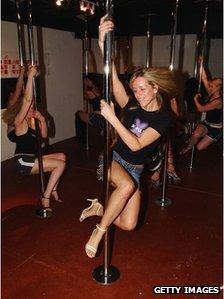Teachers attack ‘rebranded’ sexism
- Published
- comments

Pole dancing was criticised by teachers
Teachers are warning that young people are being damaged by an over-sexualised culture.
The National Union of Teachers annual conference heard claims sexism is being “rebranded” as something fashionable and mainstream.
Delegates criticised the “raunch culture” of lap-dancing clubs and pole dancing.
Teachers, meeting in Liverpool, say it can have a “disastrous effect on the self-image of girls”.
The National Union of Teachers heard warnings from teachers that “sexism and inequality are still a huge factor in shaping women’s lives”.
The conference heard claims that old-fashioned sexism has not gone away, but has been re-invented into something that appears to be “ironic or empowering”.
Teachers warned that pole dancing clubs and beauty pageants are turning back the clock on decades of campaigning for sexual equality.
There are concerns that pupils are growing up in a culture where pornographic images are widely available, cosmetic surgery is advertised and there is a “fixation” with staying slim.
Teachers fear this can undermine young women’s self-confidence and contribute to problems such as eating disorders and anxiety about their appearance.
This can disrupt both girls’ school work and their social life, say teachers.
The motion said: “Growing up in a world where it is normal for women’s bodies to be seen as sex objects affects the way that girls in our schools grow to view themselves and their place in society.”
There were also claims that this is linked to the number of sexual assaults and incidents of domestic violence.
Delegates called for recognition of the negative impact of sexism and the need to protect equal rights for women.
In an earlier debate on the conference on Sunday, teachers described the problems of young people living in an environment with such widespread access to pornography.
A teacher from east London talked of pupils setting up websites showing sexual images of teenage girls in their schools.
NUT delegate Kiri Tonks said social media was making it easier for sexism to be spread and better sex education for both sexes was needed.
"It is having a real impact on behaviour," she told BBC News.
"Girls and women internationally are victims of violence that has come out of these kinds of attitudes, but if we want to change the behaviour, we have to talk to boys as well."
Sex and relationship education is compulsory in state-funded secondary schools, but it is up to primary schools to decide if they want to teach it.
'Young children'
Last week, the Association of Teachers and Lecturers’ annual conference also heard warnings of pupils viewing aggressive sexual images.
Teachers said they feared pupils could be “desensitised” by such images and called for more guidance on how schools should tackle such an over-sexualised youth culture.
Even very young children were inadvertently exposed to such images, the ATL conference heard, either by watching video games with older children or watching late night television.
Teachers said that they had heard sexually explicit language from young children.
NUT general secretary Christine Blower said: “It is important for all children and young people to learn, in an age-appropriate manner, about respect for their own and other people’s bodies and emotions.
“This is all the more important given the rising levels of pornography which is very much in the public domain. There also continues to be a high rate of sexual harassment and homophobic bullying in society at large, despite efforts in schools to address and reduce it.”
A spokeswoman for the Department for Education said ministers were clear about the importance of PSHE (Personal, social and health education).
"PSHE encompasses a number of different areas, many of which are compulsory," she said.
"Beyond that it is right that teachers are given the freedom to tailor PSHE to the pupils whose needs they know best. We are funding the PSHE Association to demonstrate best practice in covering the subject."
- Published21 March 2013
- Published21 November 2011
- Published22 January 2013
- Published8 September 2011
- Published4 June 2011
- Published3 June 2011